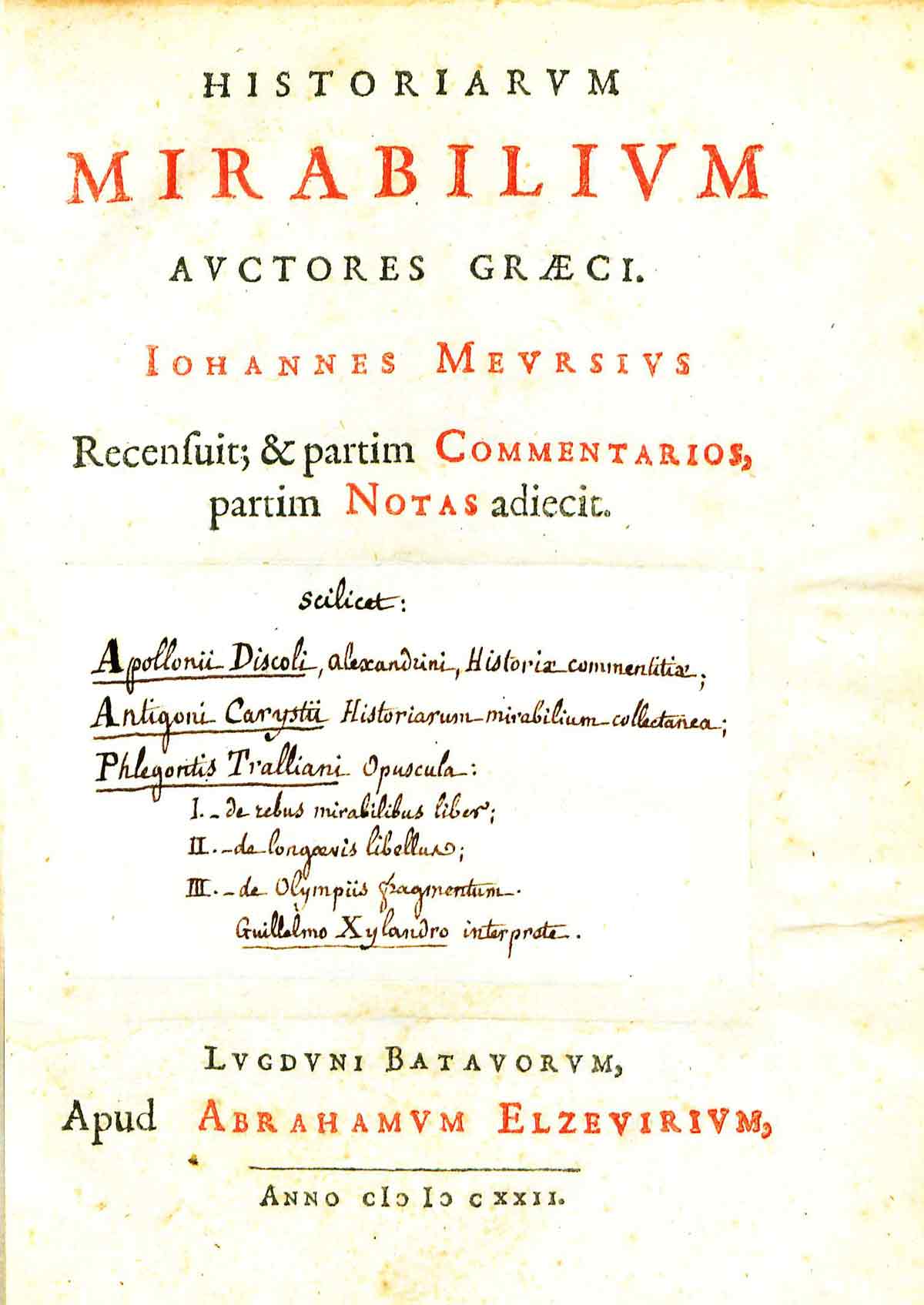Historiarum Mirabilium Auctores Graeci
| Historiarum Mirabilium Auctores Graeci | |
|
Title page from Historiarum Mirabilium Auctores Graeci, George Wythe Collection, Wolf Law Library, College of William & Mary. | |
| Editor | Johannes Meursius |
| Published | Lugduni Batavorum: Apud Abraham Elzevirium |
| Date | 1622 |
| Language | Greek and Latin |
| Pages | [20], 174, [10], 210, [10], 190 |
| Desc. | 4to (20 cm.) |
| Location | Shelf H-1 |
In this 1622 volume of parallel Greek and Latin translations, Dutch classical scholar Johannes Meursius compiled selected works of three Greek authors. Antigonus of Carystus flourished in the 3rd century BCE and wrote on various subjects including biography and art history.[1] Only fragments remain of his main work, Lives of Philosophers, but his Collection of Wonderful Tales survives in the writings of Aristotle and Callimachus.[2] Little is known of the life of Apollonius Dyscolus who flourished around 130 CE. Considered the founder of scientific grammar, he wrote primarily on syntax.[3] Only four of his 20 works survive.[4]
Phlegon of Tralles, a freedman of Hadrian, lived in the 2nd century AD.[5] Only fragments survive of his main work, Olympiads, but two smaller works are also extant. On Marvels presents "some ridiculous stories about ghosts, prophecies and monstrous births,"[6] while On Long-lived Persons compiles a list of Italians who lived to be over 100 years old.[7]
Historiarum Mirabilium Auctores Graeci presents the surviving fragments of Apolloinus's grammatical works, the Collection of Wonderful Tales by Antigonus, and Phlegon's On Marvels, On Long-lived Persons as well as fragments of Olympiads. Meursius includes separately paginated sections for each of the authors. These sections include one or more commentaries by the editor as well as an index.
Evidence for Inclusion in Wythe's Library
Included in the Brown Bibliography based on an exchange of letters between George Wythe and Thomas Jefferson.[8] On April 22, 1790, Wythe wrote to Jefferson, "I have not been able, after long inquiry, to obtain the writings of Phlegon mentioned by Ferguson in his tables and tracts." Jefferson replied on June 13, 1790, "The best edition of these fragments of Phlegon is that given by Meursius at Leyden in 1622. In 4to. Gr. & Lat. with notes." Jefferson reference is to Historiarum Mirabilium Auctores Graeci, compiled and edited by Johannes Meursius. According to Brown, Jefferson never owned a copy of this edition and he did not inherit one from Wythe. We cannot be entirely certain that Wythe successfully obtained this volume. However, given his strong interest in Greek authors and his documented search for it, the Wolf Law Library purchased a copy of Historiarum Mirabilium Auctores Graeci as suggested by Jefferson.
Description of the Wolf Law Library's copy
Bound in eighteenth century crushed morocco, smooth spine, divided into six panels by gilt chain link device. Title in gilt to second panel, remaining panels with central gilt lozenge, covers with triple fillet border, gilt roll to edges and inner dentelles. The printer's device has been excised from the title page and replaced with a window-mounted manuscript detailing the contents. Purchased from Temple Rare Books.
Images of the library's copy of this book are available on Flickr. View this book in William & Mary's online catalog.
See also
References
- ↑ Frank William Walbank and Andrew F. Stewart, "Antigonus", in Oxford Classical Dictionary (Oxford: Oxford University Press, 2012), accessed April 8, 2024.
- ↑ "Antigonus of Carystus", in Encyclopaedia Britannica, 11th ed., ed. by Hugh Chisholm (Cambridge: Cambridge University Press, 1911) 2:125-126, accessed April 8, 2024.
- ↑ "Apollonius (the Surly)", in Encyclopaedia Britannica, 11th ed., ed. by Hugh Chisholm (Cambridge: Cambridge University Press, 1911) 2:186, accessed April 8, 2024.
- ↑ Peter Barr Reid Forbes, Robert Browning, and Nigel Wilson, "Apollonius", in Oxford Classical Dictionary (Oxford: Oxford University Press, 2015), accessed April 8, 2024.
- ↑ Kenneth S. Sacks, "Phlegon", in Oxford Classical Dictionary (Oxford: Oxford University Press, 2016), accessed April 8, 2024.
- ↑ "Phlegon", in Encyclopaedia Britannica, 11th ed., ed. by Hugh Chisholm (Cambridge: Cambridge University Press, 1911) 21:447, accessed April 8, 2024.
- ↑ Ibid.
- ↑ Bennie Brown, "The Library of George Wythe of Williamsburg and Richmond," (unpublished manuscript, May, 2012) Microsoft Word file. Earlier edition available at: https://digitalarchive.wm.edu/handle/10288/13433
External Links
Read this book in Google Books.
